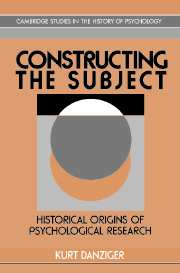Book contents
- Frontmatter
- Contents
- Preface
- 1 Introduction
- 2 Historical roots of the psychological laboratory
- 3 Divergence of investigative practice: The repudiation of Wundt
- 4 The social structure of psychological experimentation
- 5 The triumph of the aggregate
- 6 Identifying the subject in psychological research
- 7 Marketable methods
- 8 Investigative practice as a professional project
- 9 From quantification to methodolatry
- 10 Investigating persons
- 11 The social construction of psychological knowledge
- Appendix
- Notes
- Index
- Frontmatter
- Contents
- Preface
- 1 Introduction
- 2 Historical roots of the psychological laboratory
- 3 Divergence of investigative practice: The repudiation of Wundt
- 4 The social structure of psychological experimentation
- 5 The triumph of the aggregate
- 6 Identifying the subject in psychological research
- 7 Marketable methods
- 8 Investigative practice as a professional project
- 9 From quantification to methodolatry
- 10 Investigating persons
- 11 The social construction of psychological knowledge
- Appendix
- Notes
- Index
Summary
Historical studies of the sciences tend to adopt one of two rather divergent points of view. One of these typically looks at historical developments in a discipline from the inside. It is apt to take for granted many of the presuppositions that are currently popular among members of the discipline and hence tends to view the past in terms of gradual progress toward a better present. The second point of view does not adopt its framework of issues and presuppositions from the field that is the object of study but tends nowadays to rely heavily on questions and concepts derived from studies in the history, philosophy, and sociology of science. A history written from the insider's point of view always conveys a strong sense of being “our” history. That is not the case with the second type of history, whose tone is apt to be less celebratory and more critical.
In the case of the older sciences, histories of the second type have for many years been the province of specialists in the history, philosophy, or sociology of science. This is not, or perhaps not yet, the case for psychology, whose history has to a large extent been left to psychologists to pursue. Accordingly, insiders' histories have continued to have a prominence they have long lost in the older sciences. Nevertheless, much recent work in the history of psychology has broken with this tradition.
- Type
- Chapter
- Information
- Constructing the SubjectHistorical Origins of Psychological Research, pp. vii - xPublisher: Cambridge University PressPrint publication year: 1990

